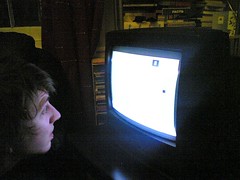Is this BT ambient interface
December 13, 2004 | CommentsGah! \"3G will be attractive
December 13, 2004 | CommentsGah! "3G will be attractive primarily to gizmo freaks who care about cool factor and to enterprises with applications that demand ubiquity, such as field service representatives who require access to corporate data from the road or customer sites."
Of course it will. Because look at the fixed-line internet, eh? The only people who moved beyond dial-up were gizmo freaks, weren't they? I mean, ubiquity is just something for corporations, isn't it? Mobile phones are just for talking, aren't they? This Internet thing will never take off...
We spent yesterday afternoon round
December 12, 2004 | CommentsWe spent yesterday afternoon round Antony and Elizabeths; she's a CodeFarmer, and he's the newest FP recruit. They're both sushi nuts too, and had prepared a fantastic spread by the time we'd meandered over. Also in attendance were Mike and James from FP and Mr Andersen, a friend of Antonys from the EASy course, who's looking into models for intelligence.
 After grazing until fit to burst, attention turned to an old Atari VCS console, which was booted up into Pong. I hadn't played Pong in absolutely years, and was quite shocked at how enjoyable it was. It was quite interesting to examine such an incredibly simple game and see how so much enjoyment had been teased out of it - in the same way that geneticists study simple organisms, I guess.
After grazing until fit to burst, attention turned to an old Atari VCS console, which was booted up into Pong. I hadn't played Pong in absolutely years, and was quite shocked at how enjoyable it was. It was quite interesting to examine such an incredibly simple game and see how so much enjoyment had been teased out of it - in the same way that geneticists study simple organisms, I guess.
The games seemed to have been designed with a long attention span in mind: matches between 2 players went up to 21 points, which seemed quite an investment in time (but actually served to build tension: as we neared 21, the pressure was really on).
We all learned more about PongWorld, and its characteristics, in the course of playing; for instance, you could knock the ball with the top edge of your bat in order to send it careering in a new direction. I got the impression that there were rules underlying the game which I could infer, but which weren't completely understood.
A minor adjustment to the gameplay kept you focused on it: after batting the ball, pressing fire on your paddle (yes! An analogue PADDLE!) sped up the ball, for as long as you had the button pressed. This meant that as well as directing the thing, you were constantly watching to see if you can sneak the ball past your opponents guard, or fool them by varying its speed - and that your involvement didn't pause whilst you waited for your opponent to return the ball.
It was only fun to play against another person; we all thought it'd be a dull game to play against a machine.
There was a crude mapping between the game (the variant we played was called "soccer", with a "goal" at each end of the screen) and a real-world concept... and despite the fact that it was a really crude mapping (we all knew that soccer is nothing like this game) it didn't matter a jot.
Sound was incredibly basic, but used sensibly - again, to build tension with a rising tone as the game sped up.
The evolution of Mario
December 12, 2004 | CommentsThe demise of PalmOS is
December 12, 2004 | CommentsThe demise of PalmOS is rumoured, at the same time as Symbian gets threatened by Linux from below, and Savaje from above.